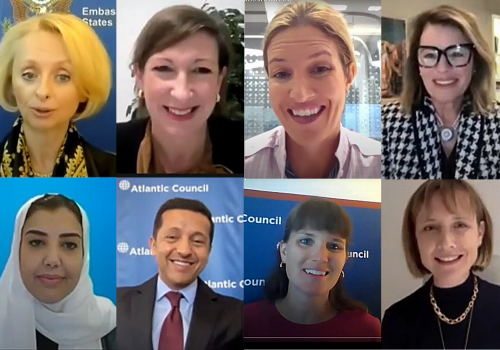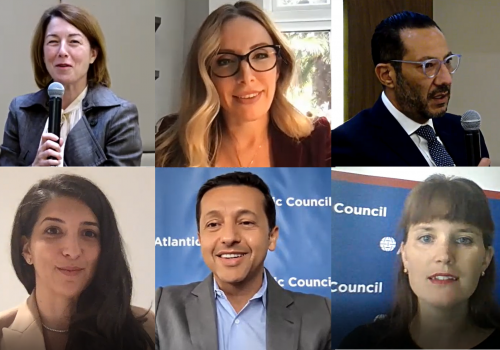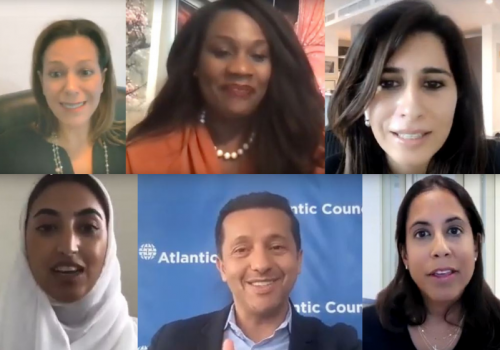Promoting more women in leadership is “a business imperative” and key to unlocking economic prosperity, say top executives
On June 7, the Atlantic Council’s empowerME Initiative held a workshop to discuss strategies for empowering more women to reach senior leadership positions in Saudi Arabia and the wider Middle East and North Africa (MENA) region. The in-person components were convened in partnership with the American Chamber of Commerce Saudi Arabia’s Women in Business Committee and hosted by KPMG Saudi Arabia.
Balance of power: Promoting more women in leadership featured keynote welcome remarks by US Mission to the Kingdom of Saudi Arabia Chargé d’Affaires Martina Strong, welcome remarks by KPMG in Saudi Arabia and Levant Chairman and CEO Dr. Abdullah Al Fozan, and a panel moderated by Entrepreneur Middle East Managing Editor Tamara Pupic featuring PepsiCo Human Resources Director Rima Al Soraihi, Cisco Vice President for Middle East and Africa Reem Asaad, Boeing Executive Vice President and Senior Advisor Leanne Caret, and UPS President for International Public Affairs and Sustainability Penelope “Penny” Naas.
This was the first in a series of four events for the WIn (Women Innovators) Fellowship, led by the Atlantic Council’s empowerME Initiative in cooperation with Georgetown University’s McDonough School of Business and with support from US Embassy Riyadh, PepsiCo, and UPS.
The key points from the discussion are summarized below.
Challenges for aspiring and established women leaders:
- While celebrating the “amazing change” that has taken place over the past six years in Saudi Arabia, Abdullah Al Fozan stressed that “the women’s empowerment movement is new here in Saudi.” He added that Saudi women only entered the professional services industry in 2007, but after a “challenging journey” over three hundred women are now part of KPMG’s national workforce.
- Rima Al Soraihi identified “lack of mobility,” particularly due to caregiving obligations and family restrictions, as “one of the biggest challenges that women are facing” that limit their labor force participation in Saudi Arabia. Gender discrimination and exclusion of women from decision making processes are additional barriers; Al Soraihi advised women facing the latter to ask male colleagues to recap key conversations until eventually they are included.
- Reem Asaad argued that barriers to women in leadership “are not specifically a Saudi issue, but more of a global issue,” and Leanne Caret concurred that “more times than not, the conversations are identical” in Europe, the United States, and Saudi Arabia.
- Asaad pointed to three obstacles that can contribute to the disparity between the amount of women holding entry-level positions versus senior roles. First, age-old stereotypes about women’s leadership styles persist: women are perceived as “confrontational, aggressive, too emotional, or weak.” Second, unconscious bias can hinder women’s professional growth, especially since research indicates that “in many cases for career progression men are judged based on their potential, whereas women are judged on their past performance.” Third, women have a responsibility to “take a moment to look within” and identify ways they might hold themselves back, in order to challenge the limitations of societal and cultural conditioning.
- Caret emphasized the importance of top leadership representing the organization’s entire workforce and the community in which they work: “We can talk all day about how we believe in inclusivity, diversity, and equity, but if the leadership doesn’t reflect that type of a world, then you’re not going to believe that it exists for you.” Boeing’s work has yielded positive results, as minority representation has increased since the start of the pandemic, and 2021 was the first year in decades that women have not left the workforce at a higher rate than men.
Role of the public and private sectors in driving change:
- Penny Naas explained that setting mandates on gender representation in countries like Saudi Arabia can be “really impactful in shifting cultural norms.” She commented that “the threat of quotas on boards has really moved the needle in a lot of countries,” and a similar government policy in Saudi Arabia “might be very helpful” for companies to realize it is in their best interest to have diverse boards. However, she cautioned that another focus must be structuring systems to attract “the best talent for the job” because women will struggle to feel a sense of belonging and to advance in their careers if they are not a good fit and have simply satisfied a quota.
- Asaad said that while the private sector “should hold itself to account” and provides expertise that shapes government policy, it is the public sector that “in many ways often sets the tone.” She highlighted how Saudi Arabia is “leading the way” with its Vision 2030 goal to increase women’s labor force participation from 22 percent to 30 percent. The private sector is following suit, including the Arab Institute for Women’s Empowerment, which recently announced its plan to invest in training Saudi women, which is expected to have a “return on investment of $400 billion by 2030.” Asaad also praised the UAE Gender Balance Council as “setting a great example of how businesses should work.”
- Al Fozan stressed the “power of legislation” when first established by the government and then applied to a company-specific context. From 2015 to 2020, he oversaw an internal version of the Nitaqat program, which resulted in a boost in nationalization from 20 percent to 42 percent. He also set a quota for women’s representation at KPMG; the firm now has ten female directors and three female partners.
Top leadership skills that women must develop:
- Noting the global period of transition and prime opportunity for innovation during the pandemic, Naas stressed that women should align with “the people who are ready for the change” and who will “help build your confidence and your career,” while purposefully disregarding the opinions of “the people you’re never going to be able to convince.” Naas also underlined that humor can be used to “disarm situations” that are potentially demeaning to women to “take back the power, elevate your status, and be seen as a leader.”
- In order to reach their full potential, Asaad advised aspiring women leaders to practice self-belief and “become your own champion”; “learn to ask for help” and as a byproduct, expand your professional network; and “continue learning at every stage of your career.”
- Al Soraihi highlighted the need to “own your career” by taking initiative to create and add value, asking for critical experiences and for support in developing new skills, and quickly adapting to change as multinational corporations continue to evolve.
- Caret shared the “Four G’s” that have been imperative throughout her career: grit (being known for delivering on your commitments); gumption (transcending imposter syndrome to put yourself out there); grace (giving yourself and others a break, which then dictates how others treat you); and gratitude (how you comport yourself and thank others).
Strategies to ensure more women reach leadership positions:
- Reflecting on the success of PepsiCo’s global Work That Works program, Al Soraihi advised companies to offer “greater flexibility on where or how work can happen,” so that women and mothers in particular have the option to telework. Caret added that organizations should give both men and women the option “to step away from their careers” and come back later without starting over completely.
- Asaad stressed that formal mentorship programs are “one of the underused and underrated resources” for aspiring women leaders, while Caret emphasized that informal, casual mentorship from colleagues outside of your traditional reporting structure can also have a profound impact. According to Naas, sponsorship is another key tool, and having more than one advocate at talent discussions can propel your career forward.
- Caret emphasized that it is crucial to have women in leadership “who can identify microaggressions and call them out” and women on hiring teams to ensure highly-educated women graduates—who are now the majority—join the workforce, especially in STEM fields.
- Pupic lauded the critical role that male allies play in championing women’s advancement to leadership roles, while Naas cautioned that “we need to bring men with us” so they see women’s empowerment as “expanding the pie as opposed to swapping out a piece of the pie.” Research reveals that across the G7 countries, the people who support female leadership the least are men between the ages of eighteen and thirty-five.
- Ultimately, empowering more women to reach positions of senior management and leadership is “a business imperative,” according to Caret, who cited that diverse boards lead more profitable companies. Asaad concurred that “it’s not just about moral duty or diversity and inclusion—it’s really about economic prosperity for a nation.”
Allison Holle is assistant director of the Atlantic Council’s empowerME Initiative. Follow her @AllisonHolle.
Further reading
Mon, Nov 8, 2021
Top women execs on leading “deliberate” organizational change, fostering diversity and inclusion, and coping with challenges
Event Recap By Stefanie Hausheer Ali
On November 2, the Atlantic Council’s empowerME Initiative held a workshop on “Women in senior management: Masterclass in leadership.”
Mon, Oct 18, 2021
New opportunities for MENA women to plug into global commerce
Event Recap By Stefanie Hausheer Ali
Atlantic Council’s empowerME Initiative held a workshop on “Women in the global supply chain: The importance of increasing women's access.”
Mon, Sep 20, 2021
‘Investing in women is just good business’: Ways to increase funding for women-led ventures in the Middle East
MENASource By Stefanie Hausheer Ali
On September 14, 2021 the Atlantic Council’s empowerME Initiative held a workshop on “Venture Capital Financing: How to Increase Funding for Women-led Ventures."


